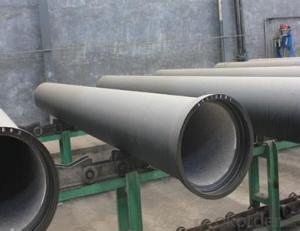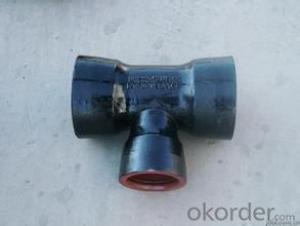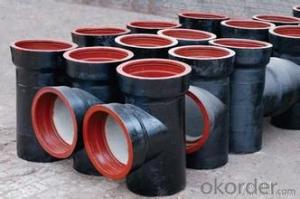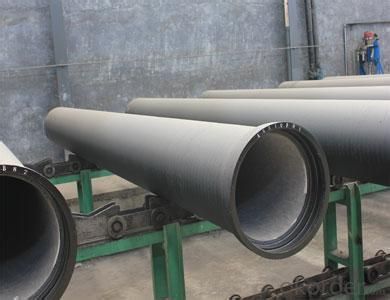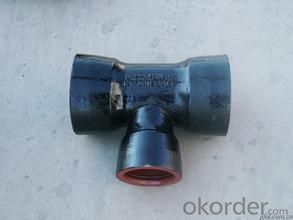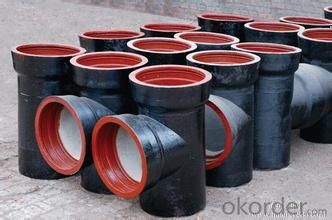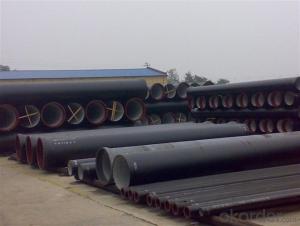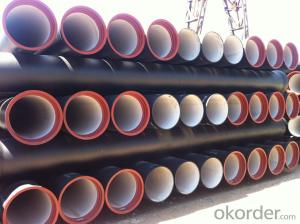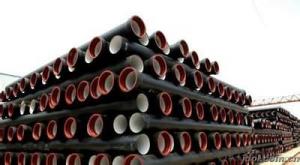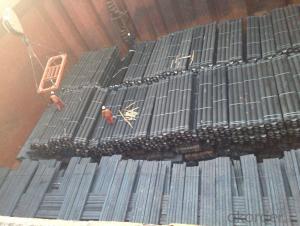DUCTILE IRON PIPE K8 DN100
- Loading Port:
- China Main Port
- Payment Terms:
- TT OR LC
- Min Order Qty:
- -
- Supply Capability:
- -
OKorder Service Pledge
OKorder Financial Service
You Might Also Like
Ductile Iron Cast Pipe is without any defects compare with tradition casting tech, which has many advantages particularly as follow:
(1) High density. In the "vertical upward casting" process, the melt iron of centre liquid column in center crystallizer is continuously feeding for volume shrinkage caused by condensation tube at outer circumference , which lead to be free of shrinkage porosity.
(2) High purity. When melt iron pouring, the mixed impurities such as gas, dross, sand grain which are lighter than melt iron could be eliminated at furnace mouth, its impossible to enter into the crystallizer through the channel, so the melt iron into the crystallizer is very pure.
(3) Strength with toughness. The cooling speed provided by continuous crystallizer is 30 times than sand casting and 5 times than centrifugal casting, and doesn't produce white iron, the eutectic cell volume of continuous cast iron is one eighth to one tenth compare with traditional cast iron. The density of graphite nodule in ductile iron can reach 300-700 pcs/mm2. Therefore, all reason above improve the strength and toughness of continuous cast iron.
(4) Free machining. The high speed cooling make the hardening phase (such as boride, steadite) not appear like reticular, massive or thick, but diffuse like fish bone and pane in shape, moreover, there are tiny graphite flakes inlaid hardening phase. It's free machining in BrinellHardness the range of 250-300HB. However, the Brinell Hardness of 250 is top limit to common metal materials.
(5) Uniform composition of tube wall. The convection mixing of liquid column caused by marching type drawing in crystallizer make the composition of tube wall well-distributed, and concentration gradient very little.
(6) High productivity. To the wall thickness of tube under 10mm, the speed of continuous casting is 1 meter/min, to the wall thickness of tube under 20mm, the speed of continuous casting is 0.5 meter/min, which is high efficiency that centrifugal or other casting tech couldn't reach.
- Q: Can ductile iron pipe be used for both water and sewage applications?
- Yes, ductile iron pipe can be used for both water and sewage applications. It is a durable and versatile material that is resistant to corrosion and can handle the pressure and flow requirements of both water and sewage systems.
- Q: How does ductile iron pipe perform in high-pressure gas applications?
- Ductile iron pipe is an excellent choice for high-pressure gas applications due to its unique characteristics and properties. Firstly, ductile iron pipe is known for its high tensile strength, which allows it to withstand the high pressure exerted by gas flowing through the pipeline. This strength ensures that the pipe can safely contain the gas without any leakage or rupture. Moreover, ductile iron pipe has a high resistance to corrosion, making it suitable for gas applications where the pipeline may come into contact with moisture, chemicals, or other corrosive substances. This resistance to corrosion ensures the longevity of the pipe and minimizes the risk of any damages or failures that could be caused by corrosion. Another advantage of ductile iron pipe in high-pressure gas applications is its ability to handle thermal expansion and contraction. When gas is transported at high pressures, there can be significant temperature variations, leading to expansion and contraction of the pipeline. Ductile iron pipe's flexibility allows it to accommodate these changes without causing any structural issues or compromising its performance. Furthermore, ductile iron pipe has a smooth interior surface, which reduces friction losses and pressure drops, allowing for efficient gas flow. This smoothness also minimizes the chances of gas impurities or debris getting trapped, which could potentially cause blockages or flow disruptions. In summary, ductile iron pipe is a reliable and durable choice for high-pressure gas applications. Its high tensile strength, corrosion resistance, ability to handle thermal expansion, and smooth interior surface all contribute to its excellent performance in such demanding conditions.
- Q: Is the cast iron pipe buried in need of antiseptic treatment? What kind of anticorrosive materials are used?
- Need general brush oil can.
- Q: What's the difference between grey cast iron pipe and ductile iron pipe?
- Ductile iron is close to medium carbon steel and is much cheaper. Vermicular graphite iron is the best, but grey iron is worse and white iron is the worst. Therefore, the quality of ductile iron pipe with better quality and price is superior to other cast iron pipe fittings.
- Q: Are ductile iron pipes resistant to microbiologically induced corrosion?
- Generally, ductile iron pipes exhibit resistance to microbiologically induced corrosion (MIC). Ductile iron, a variant of cast iron, undergoes treatment involving the addition of magnesium to enhance its strength and flexibility. Consequently, this process forms a protective layer on the iron's surface, rendering it less prone to corrosion initiated by microorganisms. MIC arises when specific bacteria, fungi, or other microorganisms interact with the metal surface of pipes, producing corrosive byproducts. Nevertheless, ductile iron generally resists MIC due to the presence of the protective layer, which acts as a barrier, thus preventing direct contact between microorganisms and the metal surface. Furthermore, ductile iron pipes are often coated with cement mortar or other protective coatings, further bolstering their corrosion resistance. These linings supply an additional layer of defense against microorganisms, reducing the likelihood of MIC. Nevertheless, it is crucial to note that the extent of resistance to MIC can vary depending on the specific conditions and environment in which the pipes are installed. Factors such as water quality, temperature, and the presence of certain microorganisms can influence the susceptibility of ductile iron pipes to MIC. Consequently, it is imperative to consider these factors and implement appropriate measures to prevent MIC. This may include regularly monitoring water quality, maintaining the pipes properly, and employing corrosion inhibitors or biocides when necessary.
- Q: What is the wall thickness of K10 grade dn=400 ductile iron pipe?
- Ductile iron pipe is a kind of cast iron. It is an alloy of iron, carbon and silicon. Graphite is exist in spherical form, usually graphite size is 6-7, casting spheroidization grade control requirements for 1-3 quality (spheroidization rate greater than 80%), so the mechanical properties of the material itself has been improved, has the essence of iron, steel performance. The annealed ductile iron pipe is composed of ferrite and pearlite. The mechanical properties of the ductile iron pipe are better.
- Q: How do ductile iron pipes handle ground settlement near construction sites?
- Ductile iron pipes are highly resilient and can withstand ground settlement near construction sites. Due to their flexible nature, these pipes can accommodate small movements and settlement without incurring significant damage or failure. The ductility of the material allows the pipes to bend and adjust to the changing ground conditions, ensuring their integrity and minimizing the risk of leaks or breakage. Additionally, the strong and durable properties of ductile iron make it a reliable choice for underground infrastructure, providing long-term stability even in challenging environments.
- Q: How do ductile iron pipes handle ground movement due to tree roots?
- Ductile iron pipes have excellent resistance to ground movement caused by tree roots. The material's high strength and flexibility allow it to withstand root penetration and continue to function effectively. Additionally, the joints in ductile iron pipes are designed to accommodate some degree of movement, further minimizing the impact of tree roots on the pipe's integrity.
- Q: Can ductile iron pipe be used for power plant cooling water systems?
- Yes, ductile iron pipe can be used for power plant cooling water systems. Ductile iron pipe is known for its strength, durability, and corrosion resistance, making it a suitable choice for transporting water in power plant cooling systems. Additionally, its ability to withstand high pressure and temperature variations makes it a reliable option for such applications.
- Q: Can ductile iron pipes be used in tunneling or microtunneling projects?
- Yes, ductile iron pipes can be used in tunneling or microtunneling projects. Ductile iron pipes are known for their strength, durability, and flexibility, making them suitable for underground applications. They can withstand the external pressure exerted by the surrounding soil or rock during tunneling, ensuring the integrity and safety of the project. Additionally, ductile iron pipes have excellent corrosion resistance properties, which is crucial in tunneling projects where the pipes are exposed to moisture and other corrosive elements. Their smooth internal surface also facilitates the flow of fluids or materials through the pipes, making them an ideal choice for tunneling or microtunneling projects.
Send your message to us
DUCTILE IRON PIPE K8 DN100
- Loading Port:
- China Main Port
- Payment Terms:
- TT OR LC
- Min Order Qty:
- -
- Supply Capability:
- -
OKorder Service Pledge
OKorder Financial Service
Similar products
Hot products
Hot Searches
Related keywords
